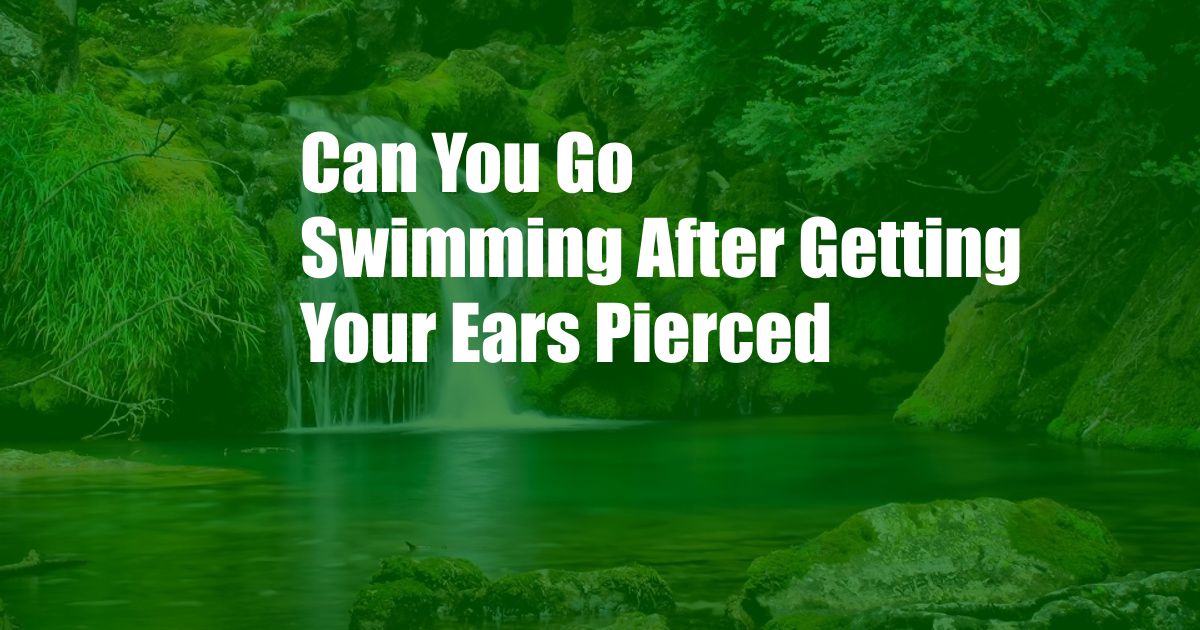
Can I Go Swimming After Getting My Ears Pierced?
As a child, getting my ears pierced was a moment I had been eagerly anticipating. However, when I asked my parents if I could go swimming after the procedure, their answer was a resounding “no.” I was disappointed, but I had to accept their decision. Years later, I delved into the topic, seeking a clearer understanding of why swimming after ear piercing is not advisable. In this article, I will explore this topic, providing a comprehensive guide to help you make an informed decision.
To better understand the subject, let’s first define ear piercing. Ear piercing involves puncturing the earlobe or other parts of the ear with a needle to create an opening for jewelry. It is a common practice, often performed for aesthetic or cultural reasons.
The Healing Process and Risks of Infection
After ear piercing, the wound needs time to heal and form a new layer of skin over the puncture. This healing process usually takes around 6-8 weeks. During this time, it is crucial to keep the piercing clean and dry to prevent infection. Water, especially in public swimming pools or natural bodies of water, contains bacteria that can enter the open wound and cause an infection.
Symptoms of an infected ear piercing include redness, swelling, pain, itching, and discharge. If you suspect an infection, it is essential to consult a healthcare professional promptly for proper diagnosis and treatment. Neglecting an infection can lead to complications such as scarring, keloids, or even more severe health issues.
Chlorine and Ear Piercings
Swimming pools typically contain chlorine, a chemical used to disinfect the water and kill bacteria. While chlorine is effective in preventing waterborne illnesses, it can also be harsh on healing ear piercings. Chlorine can irritate the wound, prolonging the healing process and increasing the risk of infection.
In addition, chlorine can weaken the newly formed skin cells around the piercing, making it more susceptible to tearing or damage while swimming or removing jewelry. It is important to note that even brief exposure to chlorinated water can potentially cause irritation or infection.
Tips for Keeping Your Piercing Clean and Safe
If you have recently gotten your ears pierced, it is essential to follow these tips to promote healing and minimize the risk of infection:
- Keep the piercing clean by washing it twice a day with a mild antibacterial soap.
- Avoid touching or playing with the piercing, as this can introduce bacteria.
- Do not remove the piercing jewelry until it is fully healed.
- Avoid swimming in pools or natural bodies of water for at least 6-8 weeks after piercing.
- If you must shower, use lukewarm water and keep the piercing dry afterward.
- Do not use harsh chemicals, perfumes, or lotions around the piercing.
FAQs About Swimming After Ear Piercing
- Q: How long after ear piercing can I go swimming?
A: It is recommended to wait at least 6-8 weeks after ear piercing before swimming.
- Q: Can I swim in the ocean after ear piercing?
A: No, it is not advisable to swim in the ocean after ear piercing due to the presence of bacteria and salt, which can increase the risk of infection.
- Q: What are the signs of an infected ear piercing?
A: Signs of infection include redness, swelling, pain, itching, and discharge.
- Q: How do I clean my ear piercing?
A: Gently wash the piercing twice a day with a mild antibacterial soap and pat it dry.
- Q: Can I use hydrogen peroxide to clean my ear piercing?
A: No, hydrogen peroxide can be too harsh for a healing piercing and may damage the tissue.
Conclusion
Getting your ears pierced is an exciting experience, but it is crucial to remember that the healing process requires proper care and attention. Avoiding swimming, especially in public or natural bodies of water, is essential to prevent infection and ensure the piercing heals properly. By following the tips and expert advice outlined in this article, you can promote a safe and successful healing experience for your new ear piercing.
Are you interested in learning more about ear piercing or other topics related to health and wellness? If so, browse our website or contact us directly for further information and valuable insights.